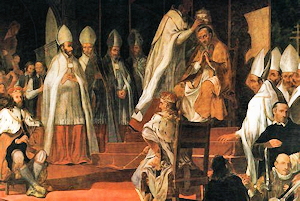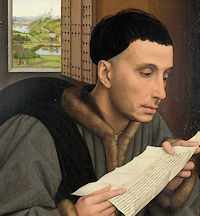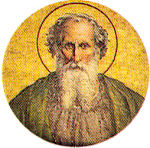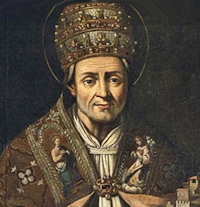Ordinary Time: May 19th
Monday of the Seventh Week of Ordinary Time
Other Commemorations: St. Peter Celestine, Pope (RM); St. Ives, Priest (RM); St. Urban I, Pope and Martyr (RM)
» Enjoy our Liturgical Seasons series of e-books!
According to the 1962 Missal of Bl. John XXIII the Extraordinary Form of the Roman Rite, today is the feast of St. Peter Celestine, founder of the Celestine Order who was elected pope when he was 72 years old and reigned for five months and St. Prudentiana, daughter of a Roman senator who consecrated herself wholly to Christ and died in the year 160 when she was sixteen. The Roman Martyrology also mentions "St. Yves, priest and confessor, who for the love of Christ defended the cause of the orphan, the widow and the poor."
St. Peter Celestine (Pope Celestine V)
Saint Peter Celestine was the eleventh of the twelve children of a poor Italian farmer. As a child, Peter had visions of our Blessed Lady, Angels and Saints. His heavenly visitors encouraged him in his prayers and chided him when he fell into any fault. His mother, though only a poor widow, sent him to school, feeling sure that he would one day be a Saint.
 At the age of twenty, he left his home in Apulia to live in a mountain solitude. Here he passed three years, assaulted by the evil spirits and beset with temptations of the flesh, but consoled by the visits of Angels. After this his seclusion was invaded by disciples who refused to be sent away; and the rule of life which he gave them formed the foundation of the Celestines, a branch of the Order of Saint Benedict. Angels assisted in the church which Peter built; unseen bells rang peals of surpassing sweetness, and heavenly music filled the sanctuary when he offered the Holy Sacrifice; he had consented to be ordained, to find in the Holy Eucharist assistance against temptation.
At the age of twenty, he left his home in Apulia to live in a mountain solitude. Here he passed three years, assaulted by the evil spirits and beset with temptations of the flesh, but consoled by the visits of Angels. After this his seclusion was invaded by disciples who refused to be sent away; and the rule of life which he gave them formed the foundation of the Celestines, a branch of the Order of Saint Benedict. Angels assisted in the church which Peter built; unseen bells rang peals of surpassing sweetness, and heavenly music filled the sanctuary when he offered the Holy Sacrifice; he had consented to be ordained, to find in the Holy Eucharist assistance against temptation.
Suddenly the poor anchorite found himself torn from his loved solitude, having been named by acclamation to the Papal throne, which had remained vacant for twenty-seven months. Resistance was of no avail. He took the name of Celestine, to remind him of the heaven he was leaving and for which he sighed. He was seventy-two years old. After a reign of five months, Peter judged himself unfit for the office, and summoning the cardinals to his presence, he solemnly resigned his trust.
During the remaining three years of his life he worked many and great miracles. On the day after his abdication, his blessing after Mass healed a lame man. Saint Peter left the palace, desiring seclusion, but was brought back by the papal guards, for his successor feared a schism; crowds had followed Saint Peter. Lest he be prevailed upon to take back his office, he was put under surveillance at Anagni. Content, he remarked: I desired nothing but a cell, and a cell they have given me. And there he enjoyed his former loving intimacy with the Saints and Angels, and sang the Divine praises almost continually.
At length, on Pentecost Sunday he told his guards he would die within the week, and immediately fell ill. He received the Last Sacraments, and the following Saturday, as he finished the concluding verse of Lauds, Let every spirit bless the Lord! he closed his eyes to this world and opened them to the vision of God.
—Excerpted from The Lives of the Saints
Patronage: Aquila, Italy; bookbinders.
Highlights and Things to Do:
- St. Peter Celestine proved one could place a life of humility above the highest ecclesiastical honors. Think of a specific way in which you can imitate him.
- Read more about St. Peter Celestine:
- See his statue on St. Peter's Basilica Colonnade.
- His relics are now located in the Basilica of Santa Maria di Collemaggio in Aquila, Italy.
- Read St. Peter Celestine's biography from The Lives or the Fathers, Martyrs and Other Principal Saints by the Rev. Alban Butler.
- See also Italy Heritage for more information.
St. Ives (or Yves or Ivo) Kermartin of Bretagne
 St. Ives, born at Kermartin, near Tréguier, Brittany, 17 October, 1253; died at Louannee, 19 May, 1303, was the son of Helori, lord of Kermartin, and Azo du Kenquis. In 1267 Ives was sent to the University of Paris, where he graduated in civil law. He went to Orléans in 1277 to study canon law. On his return to Brittany having received minor orders he was appointed "official", or ecclesiastical judge, of the archdeanery of Rennes (1280); meanwhile, he studied Scripture, and there are strong reasons for holding that he joined the Franciscan Tertiaries sometime later at Guingamp. He was soon invited by the Bishop of Tréguier to become his "official", and accepted the offer (1284). He displayed great zeal and rectitude in the discharge of his duty and did not hesitate to resist the unjust taxation of the king, which he considered an encroachment on the rights of the Church; by his charity, he gained the title of advocate and patron of the poor. Having been ordained he was appointed to the parish of Tredrez in 1285 and eight years later to Louannee, where he died. He was buried in Tréguier, and was canonized in 1347 by Clement VI, his feast being kept on 19 May. He is the patron of lawyers, though not, it is said, their model, for—"Sanctus Ivo erat Brito, Advocatus et non latro, Res miranda populo." He is noted as being a great preacher and arbitor. He built a hospital with his own money, providing for the sick poor. He is known as a miracle worker, with an instance of feeding hundreds from a single loaf of bread.
St. Ives, born at Kermartin, near Tréguier, Brittany, 17 October, 1253; died at Louannee, 19 May, 1303, was the son of Helori, lord of Kermartin, and Azo du Kenquis. In 1267 Ives was sent to the University of Paris, where he graduated in civil law. He went to Orléans in 1277 to study canon law. On his return to Brittany having received minor orders he was appointed "official", or ecclesiastical judge, of the archdeanery of Rennes (1280); meanwhile, he studied Scripture, and there are strong reasons for holding that he joined the Franciscan Tertiaries sometime later at Guingamp. He was soon invited by the Bishop of Tréguier to become his "official", and accepted the offer (1284). He displayed great zeal and rectitude in the discharge of his duty and did not hesitate to resist the unjust taxation of the king, which he considered an encroachment on the rights of the Church; by his charity, he gained the title of advocate and patron of the poor. Having been ordained he was appointed to the parish of Tredrez in 1285 and eight years later to Louannee, where he died. He was buried in Tréguier, and was canonized in 1347 by Clement VI, his feast being kept on 19 May. He is the patron of lawyers, though not, it is said, their model, for—"Sanctus Ivo erat Brito, Advocatus et non latro, Res miranda populo." He is noted as being a great preacher and arbitor. He built a hospital with his own money, providing for the sick poor. He is known as a miracle worker, with an instance of feeding hundreds from a single loaf of bread.
—Excerpted from Catholic Encyclopedia
Patronage: abandoned people; advocates; attorneys; bailiffs; barristers; Brittany; canon lawyers; canonists; judges; jurists; lawyers; notaries; orphans.
Symbols and Representation: Scroll with legal seals; law books.
Often represented as: lawyer enthroned between rich and poor litigants; lawyer holding a book, with an angel near his head and a lion at his feet; lawyer surrounded by suppliants, holding a parchment and pointing upwards; lawyer surrounded by symbols of the Holy Spirit such as doves.
Highlights and Things to Do:
- Read about St. Ives:
- Life of St. Ives in the Golden Legend
- Catholic Encyclopedia
- Catholic News Agency
- St. Ives is buried in Minihy-Tréguier in the church he founded.
- Pray the Litany to St. Ives.
St. Urban
 St. Urban, who succeeded Pope St. Callistus (cf. October 14), was the 17th pope and reigned from 222 to 230. During his pontificate the Church enjoyed peace, because Emperor Alexander Severus forbade the persecution laws to be enforced. Of special interest is a decree ascribed to Pope Urban regarding use made of the gifts offered at Mass. "The gifts of the faithful that are offered to the Lord can only be used for ecclesiastical purposes, for the common good of the Christian community, and for the poor; for they are the consecrated gifts of the faithful, the atonement offering of sinners, and the patrimony of the needy" (Breviary).
St. Urban, who succeeded Pope St. Callistus (cf. October 14), was the 17th pope and reigned from 222 to 230. During his pontificate the Church enjoyed peace, because Emperor Alexander Severus forbade the persecution laws to be enforced. Of special interest is a decree ascribed to Pope Urban regarding use made of the gifts offered at Mass. "The gifts of the faithful that are offered to the Lord can only be used for ecclesiastical purposes, for the common good of the Christian community, and for the poor; for they are the consecrated gifts of the faithful, the atonement offering of sinners, and the patrimony of the needy" (Breviary).
St. Urban's body was transferred to the Church of St. Praxedes in the year 818, where it remains to this day. Some hagiographers hold that his grave is in the Church of St. Cecilia in Rome. Vintagers honor Pope St. Urban as their patron.
—Excerpted from The Church's Year of Grace, Pius Parsch
Symbols and Representation: Vine and grapes; fallen idol beneath broken column; scourge; stake; severed head
Highlights and Things to Do:
- Read more about Pope St. Urban I:
- The location of where Urban I was buried is in dispute.






